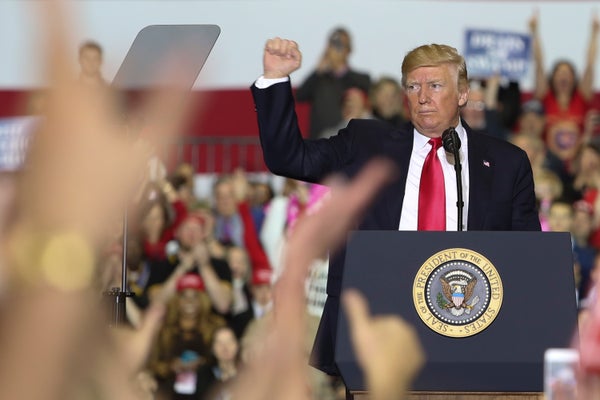The election of Donald Trump introduced the American public to a number of firsts when it comes to politics, one of which is a president who regularly communicates via Twitter. Trump’s use of social media has been unusual for a president and also the subject of sharp criticism for the inflammatory content he sometimes posts. While we know that Trump’s Twitter audience has continued to increase dramatically since his election, currently hovering at over fifty million followers, we know far less about how much influence his tweets have on the way his followers think and behave.
A disturbing new paper by researchers Karsten Müller and Carlo Schwarz of the University of Warwick suggests that Donald Trump’s Islamic-related tweets may be directly linked to an increase in anti-Muslim hate crimes over the past few years. If Trump’s tweets have, in fact, played a role in spurring hate crimes, then social media may be playing an even more powerful role in people’s lives than previously thought.
Muller and Schwarz analyzed the relationship between Trump’s tweets and anti-Muslim hate crimes by drawing upon a number of data sources, including the FBI’s hate crime data between the years 1990 and 2016 as well as Twitter usage across the country. First, they documented that the number of anti-Muslim hate crimes recorded by the FBI increased during Trump’s presidency. In fact, anti-Muslim crimes have been more prevalent under Trump compared to any other previous president, including George W. Bush following 9/11. Second, the researchers found strong statistical correlations between the number of Islam-related tweets made by Trump in a single week and the number of anti-Muslim hate crimes that took place in the days and weeks that followed. Trump’s anti-Islam tweets were only correlated with anti-Muslim crimes and not other types of hate crimes. Therefore, it seems likely that it was the specific content of Trump’s tweets, and not growing anti-minority sentiment in general, that were linked to the uptick in anti-Muslim hate crimes.
Although suggestive, these connections do not prove that Trump’s social media messages caused the spike in crimes. Perhaps Trump’s tweets simply reflected an already growing anti-Muslim sentiment from the public. So Muller and Schwarz analyzed the geographic connection between Trump’s tweets and hate crimes. Since Twitter usage tends to vary by county, they looked at whether Trump’s Islam-related tweets were related to spikes in anti-Muslim crimes where more people used Twitter. They found that the spike in hate crimes did occur mainly in U.S. counties that had high Twitter usage, and this link only showed up after the start of Donald Trump’s presidential campaign.
But still one might wonder if Twitter usage itself may have something to do with the prevalence of hate crimes in a particular geographic area. Maybe places with more Twitter users are more prone to hate-driven violence. Or maybe Twitter users themselves are more likely to be Republican or hold anti-Muslim sentiments. In fact, the data suggests the opposite is likely true. Counties with higher Twitter usage tend to be more Democratic and more ethnically diverse than counties with lower usage. They also have more citizens who prefer to get their news from MSNBC and CNN rather than Fox News. The researchers also looked at whether the areas showing a stronger pattern linking Trump’s tweets and hate crimes were characterized by greater poverty or more crime in general; they were not. There was also no evidence that areas with higher Twitter usage are more prone to hate crimes in general.
While highly suggestive, a major limitation of this research is that it is correlational not causal. In order to prove that Trump’s tweets truly caused an increase in hate crimes, the researchers would need to run a carefully controlled experiment showing that exposure to such messages leads people to act out in hateful ways. This research also does not prove that Trump’s tweets cause people to hold prejudicial views towards Muslims. In fact, the researchers themselves do not seem to believe this. Instead, they point out that their findings are consistent with the idea that Trump’s presidency has made it more socially acceptable for many people to express prejudicial or hateful views that they already possessed prior to his election.
Social media has allowed like-minded people to find each other across large physical distances. It has made it easier for people to band together in the name of social justice and organize rallies. For better or for worse, social media has allowed a greater number of Americans to make visible their political and social views on a variety of topics. Many of us may not like what we are seeing, but it is unlikely that social media is the cause of these views in the first place. What seems most clear is that we are only at the very beginning of understanding how and why social media influences both politics and the way we treat our fellow citizens in everyday life.
